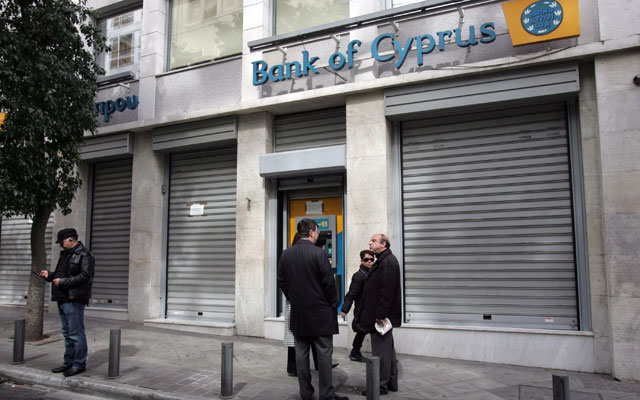Marios Lolos/Xinhua/Photoshot/Newscom
Today, Cyprus’s banks opened for the first time in more than 10 days, after Cypriot President Nicos Anastasiades—without seeking approval from his parliament—agreed to bailout terms that will raid citizens’ bank accounts.
Those banking in Cyprus should not get too excited about the banks reopening. Strict capital controls are in place, allowing account holders to remove only €300 each day from their bank accounts. Online wire transfers are currently blocked, banks will not cash any checks, and travelers leaving the country can only take up to €1,000 with them in cash.
In an utter disregard of the principle of democratic accountability, the German parliament will vote on the terms of the Cyprus bailout deal but the Cypriot parliament—representing those whose bank accounts stand to be raided—will not. This is the ugly face of the European Union (EU). As the latest situation in Cyprus demonstrates, the decay of the eurozone is now turning into the rot of the EU.
For Americans that believe in direct elections, accountable politicians, the diffusion of power, transparent and good use of taxpayer money, and states’ rights, many developments taking place today in Europe would come as a shock. The EU, an organization that began narrowly focused on the coal and steel industry in the 1950s, has now morphed into a supranational organization touching almost every aspect of life across Europe.
Over the years, economic and political power in Europe has been incrementally shifted to Brussels—away from the national capitals. The key decision-making bodies in the EU are largely unelected, and largely unaccountable to the national governments. For many, deeper European economic and political integration has become a secular religion that serves only the interest of a small group of political elites at the expense of others.
Considering the current decrepit economic state of Greece, Italy, and Cyprus, and the resulting political fallout, it is laughable to think that the EU won last year’s Nobel Peace Prize for “the advancement of peace and reconciliation, democracy and human rights in Europe.”
In responding to the eurozone crisis, the actions taken by the EU has led to political and economic instability in a way that has not been seen for decades across Europe. Extreme fascist and communist political parties are once again doing well in elections, and secessionist movements are increasing across the continent.
In many southern European countries, rioting and protests are becoming commonplace. In Greece, anarchist groups are increasingly carrying out attacks on symbols of state authority or wealth. The most recent example of this violent unrest was yesterday’s bomb explosion in Athens. Far from creating tranquility, peace, and prosperity, the EU has created instability, disenchantment, and contempt across Europe.
Now that the EU has forced these draconian economic measures onto the people of Cyprus, there will be nothing stopping them from supporting similar acts in other ailing eurozone economies like Ireland, Italy, Portugal, and Spain. In fact, Dutch Finance Minister Jeroen Dijsselbloem hinted that the Cyprus bank raid could serve as a template for dealing with future eurozone crises. Those living and investing in southern Europe should consider this a warning.
Bureaucrats in Brussels have had a taste of power and now do not want to relinquish it. Consequently, the EU has transformed into an organization that regards basic Western values of liberty, economic freedom, and self-determination as roadblocks to an eventual United States of Europe.
Europe needs to return to the fundamental basics of democracy. Power needs to be brought back to the member states and to the people. Economic policies of growth need to be pursued. Intrusive and excessive EU regulations need to be curtailed. The wasteful spending in Brussels needs to end. The excessive borrowing and entitlement programs need to stop. Until this happens, the people of Europe will pay dearly for the incompetency of Brussels.
Cyprus may be the latest crisis—but it won’t be the last.
Source material can be found at this site.










